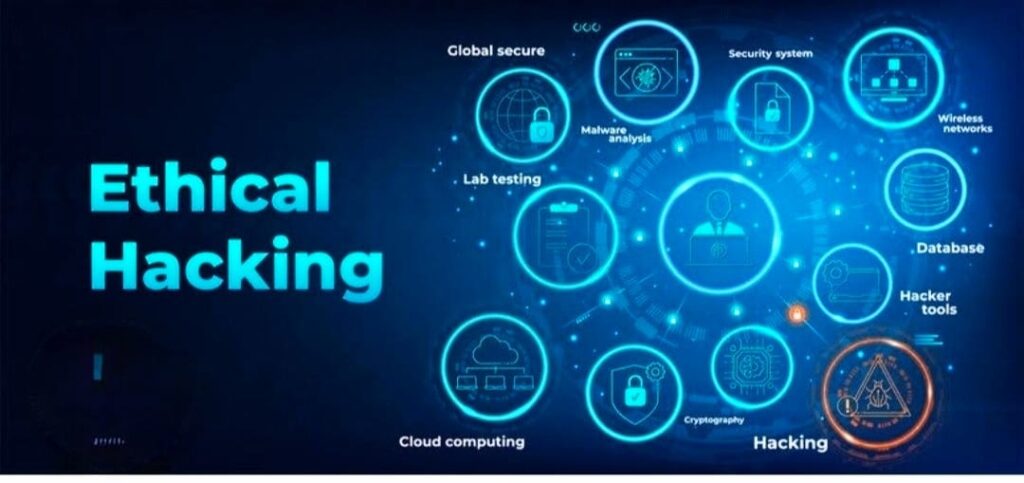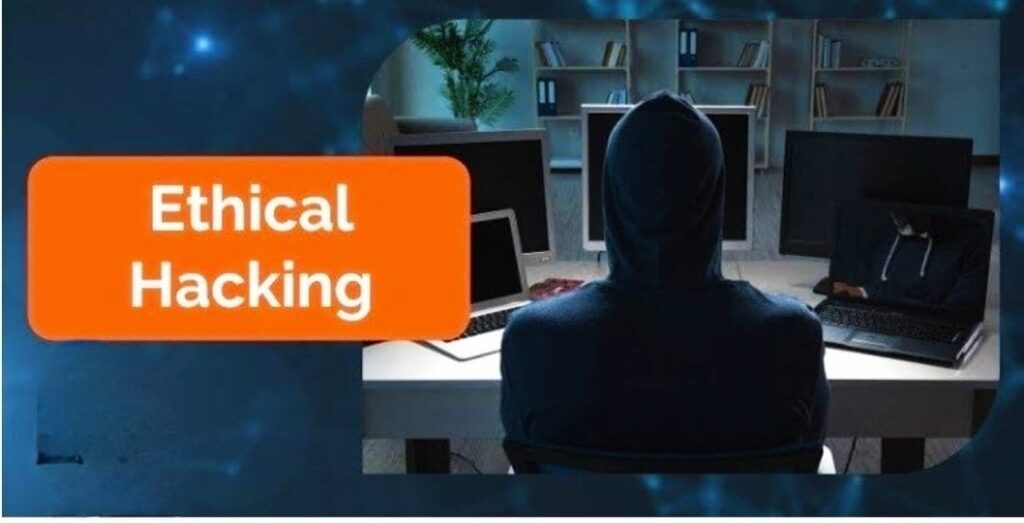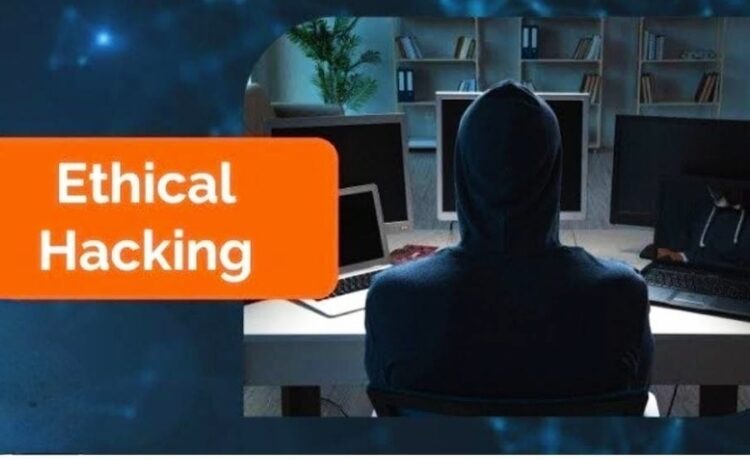In today’s modern era, the importance of ethical hacking has become progressively evident for organizations. With the revolt of cyber threats as well as security breaches, businesses are acknowledging the pivotal role of ethical hacking in protecting sensitive data and securing their digital infrastructure. Ethical hacking, also known as white-hat hacking or penetration testing, is an authorized and legal practice of trying to bypass a system’s defenses to spot potential vulnerabilities and limitations.
Role of Ethical hacking
Ethical hacking plays an important role in modern organizations for many reasons. The importance of ethical hacking lies in helping organizations to spot and resolve potential security vulnerabilities. Thereby, it fortifies its digital framework against cyber threats. Additionally, ethical hacking allows the evaluation of security measures, assuring that sensitive data remains safeguarded.
Ethical hackers, who are often appointed by organizations or work as independent consultants, utilize their skills to perform controlled cyberattacks. The goal of ethical hackers is to uncover security flaws ahead malicious actors can exploit them.
The main aim of ethical hacking is to evaluate the security posture of a system or network. Also to provide recommendations for enhancing its overall security and resilience.

Importance of ethical hacking:
Ethical hacking inculcates a proactive security approach to alleviate risks before they escalate. By performing ethical hacking, organizations can stay ahead of bitter actors. They can safeguard their reputation, and endorse customer trust, thereby stimulating a resilient and secure digital environment.
1. Protection of sensitive data:
Significance of ethical data sites in their ability to safeguard sensitive data. Additionally, it is the ability to protect proprietary business data, customer information as well and financial records, from plunging into the wrong hands.
2. Maintaining customer trust:
By establishing robust cyber security measures, the firms can maintain the trust of their customers. Also by reassuring the customers that their personal information is secured and safeguarded from cyber threats.
3. Regulatory compliance:
Ethical hacking helps organizations adhere to various regulatory compliance standards. This ensures that they encounter the necessary security requirements directed by regulatory bodies as well as industry-specific regulations.
Importance of ethical hacking in cybersecurity:
1. Preventing data breaches:
Ethical hacking plays a pivotal role in spotting the vulnerabilities within a system. Thus, helps in preventing potential data breaches that can lead to severe financial and reputational damage.
2. Enhancing security measures:
By invigorating real-world cyberattacks, ethical hackers assist organizations to fortify their security measures. This happens by mitigating the chances of unauthorized access as well as malicious activities.
3. Proactive approach to security:
Ethical hacking enables firms to acquire a proactive approach to security, facilitating them to stay ahead of cyber threats. This approach anticipates probable vulnerabilities before they can be leveraged by malicious actors.
https://www.henryharvin.com/cyber-security-courseImportance of ethical hacking in risk management:
1. Spotting vulnerabilities:
Ethical hacking helps organizations spot potential vulnerabilities within systems, networks, and applications. This allows the organizations to prioritize and address these limitations to reduce the risk of security breaches.
2. Assessing security controls:
Ethical hackers assess the effectiveness of contemporary security controls and protocols. They provide the organizations with insights into the strengths and limitations of their present security infrastructure.
3. Creating comprehensive security strategies:
By grasping the insights obtained from ethical hacking activities, firms can develop comprehensive security strategies. These are the strategies that are tailored to their particular needs and risk profiles.

Legal and ethical considerations:
Here are the main points of the ethical hacker’s code of ethics in a short form:
1. Here are a few ethical and legal considerations that ethical hackers should keep in mind.
2. They must adhere to strict ethical and legal guidelines.
3. ethical hackers should obtain explicit permission from the firm before performing any security assessment.
4. They should also ensure that their activities do not cause any disruption or harm to the organization’s operations.
5. ethical hackers should never compromise in holding the privacy of sensitive data.
Types of ethical hacking services:
1. Vulnerability assessment:
a) Identifies limitations in applications, systems, and networks.
b) Concerns vulnerabilities on a severity basis.
2. Penetration testing (pen testing):
a) Tones real cyberattacks to test defenses.
b) Discloses how well security measures handle cyber attacks.
3. Web application testing:
a) Focuses on online-based services and on securing websites.
b) Examines vulnerabilities like hacking attempts.
4. Wireless network testing:
a) Evaluate Wi-Fi network security.
b) Eyes for flaws that could permit unauthorized access.
5. Social engineering testing:
a) Assesses susceptibility to techniques like phishing.
b) Trains employees on avoiding manipulation.
6. Mobile application security testing:
a) Guarantees security of mobile apps (Android, iOS).
b) Recognizes vulnerabilities that could compromise information and data.
7. Cloud security assessment:
a) Tests security in cloud-based systems.
b) Examines permissions, settings, and access controls.
8. IoT security assessment:
a) Spots vulnerabilities in interconnected devices.
b) Concentrates on securing Internet of Things (IoT) devices.
9. Red team testing:
a) Evaluate overall security preparedness.
b) Tones advanced cyberattacks.
10. Incident Response testing:
a) Assesses the ability to identify, mitigate, and recover from attacks.
b) Aids organization’s filter responses to security incidents.
Importance of Ethical hacking in SMEs (Small and Medium-sized enterprises?
Ethical hacking helps SMEs with limited resources by providing cost-effective solutions for identifying and addressing security vulnerabilities. By proactively assessing their digital framework, SMEs can implement selective security measures. These security measures help the SMEs to protect their sensitive data and reduce the risk of cyber threats.
Career opportunities for ethical hackers:
Ethical hackers offer a wide range of career opportunities. This includes roles such as cybersecurity consultant, penetration tester, security researcher, and security analyst. With the increased demand for cybersecurity professionals, individuals who excel in ethical hacking can find employment in various industries including technology, health care, finance, and government sectors.
https://intellipaat.com/blog/what-is-ethical-hacking/Advantages and disadvantages of ethical hacking in the modern world:
Advantages:
1. Enhanced Security:
Ethical hacking assesses an organization’s spot and addresses vulnerabilities before malicious hackers exploit them, thereby building overall cybersecurity.
2. Proactive approach:
A proactive approach to ethical hacking allows companies to proactively protect their data and systems, minimizing the risk of data leaks and potential breaches.
3. Skill enhancement:
It promotes the development of skilled cybersecurity individuals as well as professionals with in-depth understanding and knowledge of vulnerabilities. Skill enhancement in ethical hacking thereby promotes a stronger defense against cyber threats.
4. Compliance:
Ethical hacking aids organizations in complying with security regulations and standards, ensuring they meet industry-specific and legal requirements.

Disadvantages:
1. Legal complexities:
The practice of ethical hacking can be legally challenging sometimes, especially when it involves testing systems without conventional authorization. This may potentially lead to legal consequences.
2. Misuse of knowledge:
Ethical hackers have significant knowledge about system vulnerabilities. This could potentially be misused if they decide to exploit the data for personal benefit or malicious activities.
3. Unforeseen consequences:
Despite vigilant planning, ethical hacking can sometimes result in unforeseen consequences such as accidental data leaks or system disruption. Unforeseen consequences can cause damage to an organization’s reputation and operations.
4. Costly and time-consuming:
Performing thorough ethical hacking evaluations can be resource-intensive as well as time-consuming. Ethical hacking requires significant time commitment and financial investment, especially for companies with limited budgets and resources.
On the whole, ethical hacking can be a pivotal tool for enhancing cybersecurity. But, it must be conducted with strict adherence to ethical standards and legal guidelines to mitigate negative outcomes as well as potential risks.
Reference links:
Whether you are preparing for your first job interview or aspiring to upskill yourself in this ever-emerging tech landscape, Henry Harvin Ethical hacking courses are your key to success. They provide top-quality content at reasonably affordable prices. Gearing towards accelerating your career growth in a time-bound manner. Join the millions we have empowered already, and now it’s your turn. Don’t miss out – check it out now!
www.henryharvin.com/ethical-hacking-course
www.icertglobal.com/role-of-ethical-hacking-in-modern-organizations-blog/detail
Conclusion:
In conclusion, the importance of ethical hacking in modern organizations cannot be exaggerated. By playing a crucial role in cybersecurity, ethical hacking assures that organizations are well-furnished to defend against progressing cyber threats. Additionally, to protect their valuable data and digital assets. Embracing ethical hacking as a proactive defensive measure is pivotal for businesses to flourish in today’s progressively increasing digital and interconnected landscape.
FAQs:
A: Ethical hacking is performed with the explicit permission of the firm to spot vulnerabilities and strengthen security. Whereas malicious hacking is unauthorized and aims to exploit vulnerabilities for personal benefit or to cause harm.
A: It is recommended that organizations perform frequent ethical hacking assessments, ideally on an annual basis. Also whenever there are significant alterations to the organization’s digital infrastructure.
A: To shine in ethical hacking, individuals should possess a strong knowledge of computer systems. It also requires a proper understanding of programming languages as well as cybersecurity principles. Other skills such as critical thinking, problem-solving, and analytical skills can help the individual to excel more.
A: Ethical hackers use various techniques such as social engineering, network scanning, password cracking, and vulnerability assessment. Ethical hackers also use system exploitation techniques to identify and address security limitations within a system or network.
A: Ethical hacking is a subsequent group of cybersecurity testing that preferably focuses on identifying vulnerabilities and limitations in a system or network. On the other hand, cybersecurity testing encompasses a broader range of assessments, including risk assessments, compliance checks as well as security audits. Thereby ensuring comprehensive protection against cyber threats.












